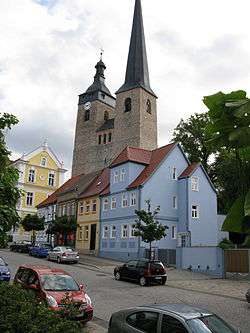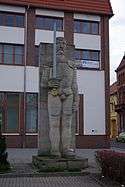Burg bei Magdeburg
| Burg | ||
|---|---|---|
 | ||
| ||
 Burg | ||
Location of Burg within Jerichower Land district  | ||
| Coordinates: 52°16′21″N 11°51′18″E / 52.27250°N 11.85500°ECoordinates: 52°16′21″N 11°51′18″E / 52.27250°N 11.85500°E | ||
| Country | Germany | |
| State | Saxony-Anhalt | |
| District | Jerichower Land | |
| Government | ||
| • Mayor | Jörg Rehbaum (SPD) | |
| Area | ||
| • Total | 164.02 km2 (63.33 sq mi) | |
| Population (2015-12-31)[1] | ||
| • Total | 22,970 | |
| • Density | 140/km2 (360/sq mi) | |
| Time zone | CET/CEST (UTC+1/+2) | |
| Postal codes | 39288 | |
| Dialling codes | 03921 | |
| Vehicle registration | JL | |
| Website | www.stadt-burg.de | |
Burg bei Magdeburg is a town of about 23,900 inhabitants on the Elbe–Havel Canal in northeastern Germany, 25 km (16 mi) northeast of Magdeburg. It is the capital of the Jerichower Land district in the state of Saxony-Anhalt.

The town is known for its mediaeval churches and towers. Due to the numerous towers and steeples Burg also carries the sobriquet City of Towers. Like other German towns and cities, Burg shows its connection to the Roland saga with a statue, which was restored in 1999.
Although the name Burg has the same form as the German word Burg (castle), it is more likely that the name comes from the Slavic word bor, meaning coniferous forest.
Burg formerly had the largest shoe manufacturing factory in Europe and was the first to produce manufactured crispbread in Germany, beginning production in 1931.
The town is notable as both the birthplace and the final resting place of General Carl von Clausewitz.
Near Burg there is a large transmission site for long- and mediumwave, which was among other things used for the transmissions of Radio Wolga.
Subdivisions
The municipality Burg bei Magdeburg consists of the town Burg bei Magdeburg and the formerly independent municipalities Detershagen, Ihleburg, Niegripp, Parchau, Schartau and Reesen.
Sons and daughters of the city
- Joachim a Burck (1546-1610), composer
- Carl von Clausewitz (1780-1831), Prussian general and important military theorist
- Hermann Eggert (1844-1920), architect
- Hermann Riedel (1847-1913), composer and conductor
- Hermann Paasche (1851-1925), politician (DVP)
- Ferdinand Kurlbaum (1857-1927), physicist
- Paul Herrmann (1866-1930), germanist
- Hermann Matern (1893-1971), politician (KPD, SED), vice president of the Volkskammer
- Ernst Schumacher (1896-1958), SPD official
- Wolfgang Seguin (born 1945), soccer player, multiple GDR national player
- Harald Jährling (born 1954), rower
- Emanuel Raasch (born 1955), cyclist
- Heiko Balz (born 1969), wrestler
- Julia Bonk (born 1986), politician (The Left), Member of Landtag (Saxony)
References
- ↑ "Bevölkerung der Gemeinden – Stand: 31.12.2015" (PDF). Statistisches Landesamt Sachsen-Anhalt (in German).
.png)